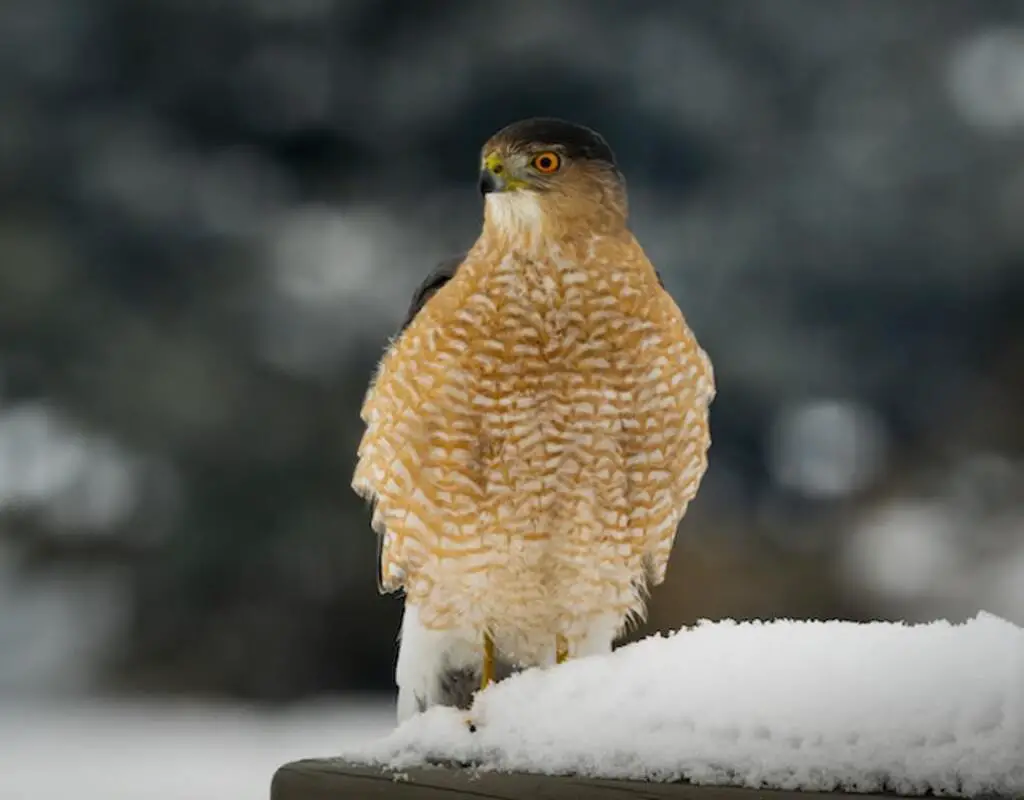Hawks are majestic birds of prey that are renowned for their hunting abilities. They are fierce predators that are known to hunt a wide variety of animals, including small mammals, reptiles, and other birds.
Squirrels, on the other hand, are small rodents that are well-known for their agility and speed. They can climb trees with ease and have sharp senses that help them detect potential predators.
In this article, we will explore the relationship between hawks and squirrels and answer the question: do hawks eat squirrels?
Table of Contents
- 1 Definition of Hawks
- 2 Definition of Squirrels
- 3 Overview of the relationship between Hawks and Squirrels
- 4 What do hawks eat?
- 5 Do Hawks Eat Squirrels?
- 6 The Hunting Process
- 7 Squirrel defense mechanisms against hawks
- 8 Conclusion
- 9 FAQs: Do Hawks Eat Squirrels?
- 9.1 Do hawks eat squirrels?
- 9.2 What other animals do hawks eat besides squirrels?
- 9.3 Why do hawks hunt squirrels?
- 9.4 Which hawk species commonly hunt squirrels?
- 9.5 How do hawks catch squirrels?
- 9.6 Do all hawk species hunt adult squirrels?
- 9.7 What defense mechanisms do squirrels have against hawks?
- 9.8 How long does it take for a hawk to catch a squirrel?
- 9.9 What is the significance of understanding the hawk-squirrel relationship?
- 9.10 How does the relationship between hawks and squirrels impact ecosystems?
- 10 Author
Definition of Hawks
Hawks belong to the family Accipitridae which includes eagles, kites, buzzards, and many more species of birds of prey. They have sharp talons and hooked beaks, which they use to catch their prey.
Most species of hawks have excellent eyesight, which helps them spot prey from high altitudes.
They also have powerful wings that allow them to soar through the sky effortlessly while scanning for potential prey.
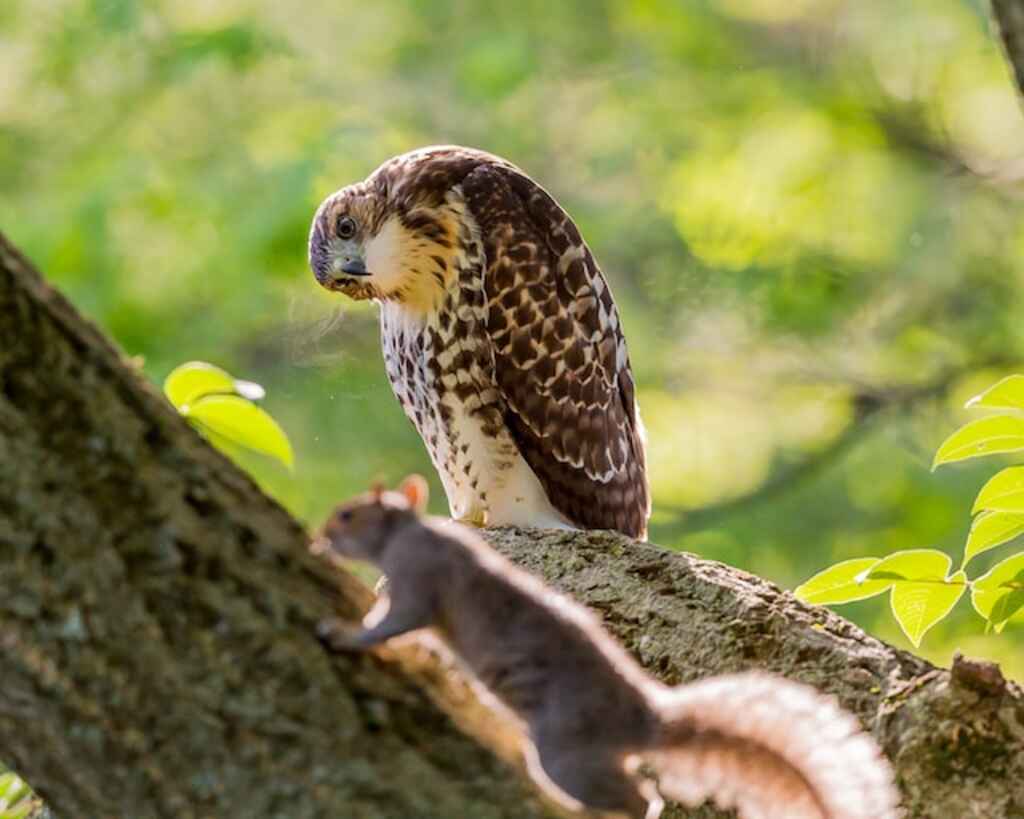
Definition of Squirrels
Squirrels belong to the family Sciuridae which includes chipmunks as well as ground, tree-dwelling squirrels.
These small rodents have sharp claws, which they use to climb trees with ease and agility. Their diet consists mainly of nuts and seeds, but they also eat insects as well as fruits when available.
Overview of the relationship between Hawks and Squirrels
The relationship between hawks and squirrels is one that is based on predator-prey dynamics. Hawks hunt squirrels as part of their natural diet, since these rodents provide an abundant source of food in many environments where both species coexist.
However, it’s important to note that not all species or populations of hawks will necessarily eat squirrels.
Factors such as geographic location, habitat type, availability of other prey, and the size and agility of the squirrel are all important considerations that will determine whether hawks will pursue squirrels as prey.
Additionally, squirrels have developed defensive mechanisms to protect themselves from predatory birds such as hawks.
These mechanisms include their agility and speed, which allow them to climb trees and escape quickly.
Overall, the relationship between hawks and squirrels is complex, with each species playing an important role in their respective ecosystems.
In the following sections of this article, we will delve deeper into how hawks hunt their prey, whether they eat squirrels specifically, and how squirrels defend themselves against predators like hawks.
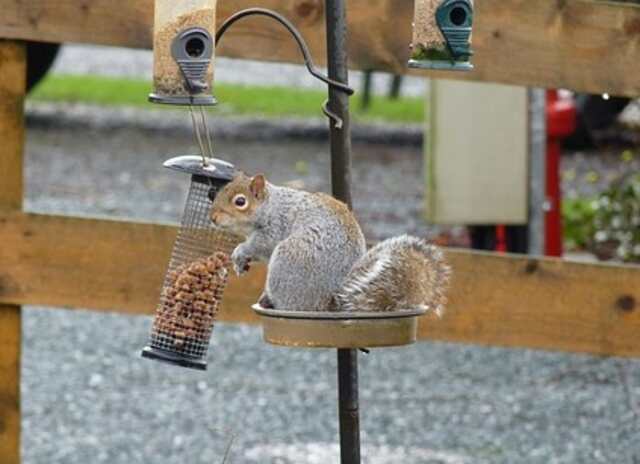
What do hawks eat?
Hawks are carnivorous birds that primarily feed on other animals. Their diet consists of a wide variety of prey, and the specific types of prey that they hunt depend on the species of hawk and their geographic location.
Some common types of prey for hawks include small mammals, such as mice, voles, and rabbits, as well as birds, reptiles, and insects.
Types of prey for hawks
Hawks are known to hunt a wide range of prey species. Some of the most common types of prey for hawks include rodents like mice and voles, small mammals like rabbits and squirrels, as well as birds like doves and pigeons.
Other prey species can include snakes, lizards, frogs, insects like grasshoppers or dragonflies.
While smaller hawks tend to hunt smaller animals like rodents or small birds, larger species can take down larger animals such as rabbits or even deer fawns in some cases.
The specific type of prey that a hawk hunts is often determined by the size and strength of the bird itself.
Characteristics of prey that hawks hunt
Hawks prefer to hunt animals that are relatively easy to catch. They look for vulnerable creatures who may be sick or injured or have diseases; thus making it easier for them to capture their target successfully.
However, hunting techniques vary from one hawk species to another depending on their natural habitat.
Prey with poor eyesight is much easier for hawks to target, since they can approach stealthily without being seen easily.
Additionally, dense vegetation has been proven beneficial in protecting these targets from aerial predators like hawks.
How Hawks Hunt Their Prey
Hawk’s hunting tactics are unique in many different ways; different hawk species have developed specialized hunting strategies depending on their environment and what they are hunting.
One of the most common techniques employed by hawks is soaring, which allows them to scan and locate their prey from above.
Once they’ve spotted their target, they will dive at high speeds to snatch it up with their talons.
Other tactics used include perching on a high vantage point and surveying the area in search of prey, or simply chasing it down.
Hawks are powerful birds of prey that have developed specialized hunting techniques to capture a wide variety of prey species.
Their diets consist mainly of small mammals and birds, as well as insects and reptiles.
The characteristics of the animals they hunt often make them easier targets for hawks, which rely on speed, agility, and sharp talons to catch their prey.
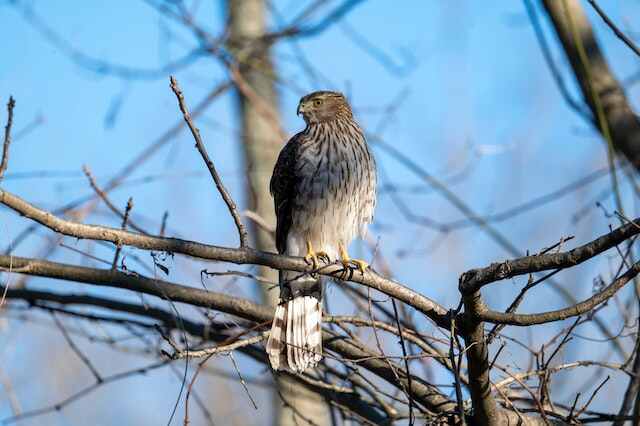
Do Hawks Eat Squirrels?
Hawks are known for being skilled hunters, and they hunt a variety of prey depending on their size and species. One common prey for some hawks is squirrels.
However, not all hawk species will hunt squirrels, and the size of the squirrel can also play a role in whether or not it becomes prey.
Examples of Hawk Species That Commonly Hunt Squirrels
There are several hawk species that commonly hunt squirrels. The Cooper’s Hawk is one such example. These birds have been known to target smaller mammals and birds, including squirrels.
They use their speed and agility to catch their prey off guard. Another hawk species that hunts squirrels is the Red-tailed Hawk.
These birds are larger than Cooper’s Hawks and have a wider range of prey options due to their size. However, they still go after squirrels when given the opportunity.
The Sharp-shinned Hawk is another species that preys on squirrels. These hawks are small but fast and agile, making them great at catching smaller prey like squirrels.
Factors That Determine Whether a Hawk Will Hunt a Squirrel
While some hawk species commonly hunt squirrels, there are factors that determine whether or not they will target this particular type of prey.
One factor is the size of the squirrel in comparison to the hawk’s own size.
For example, larger hawks like Red-tailed Hawks may be less likely to go after larger adult squirrels because they are more difficult to catch due to their size and agility.
Smaller hawks like Sharp-shinned Hawks may be more successful at hunting smaller juvenile or adolescent squirrels. Another factor is location and habitat.
Some areas have fewer squirrel populations than others, so hawks may be less likely to encounter them as potential prey options.
In addition, hunger levels can also play a role in whether or not a hawk will hunt a squirrel.
If other prey options are scarce, hawks may be more likely to go after squirrels as a source of food.
Overall, while hawks do eat squirrels, it ultimately depends on the species of hawk and the size and availability of squirrels in their environment.
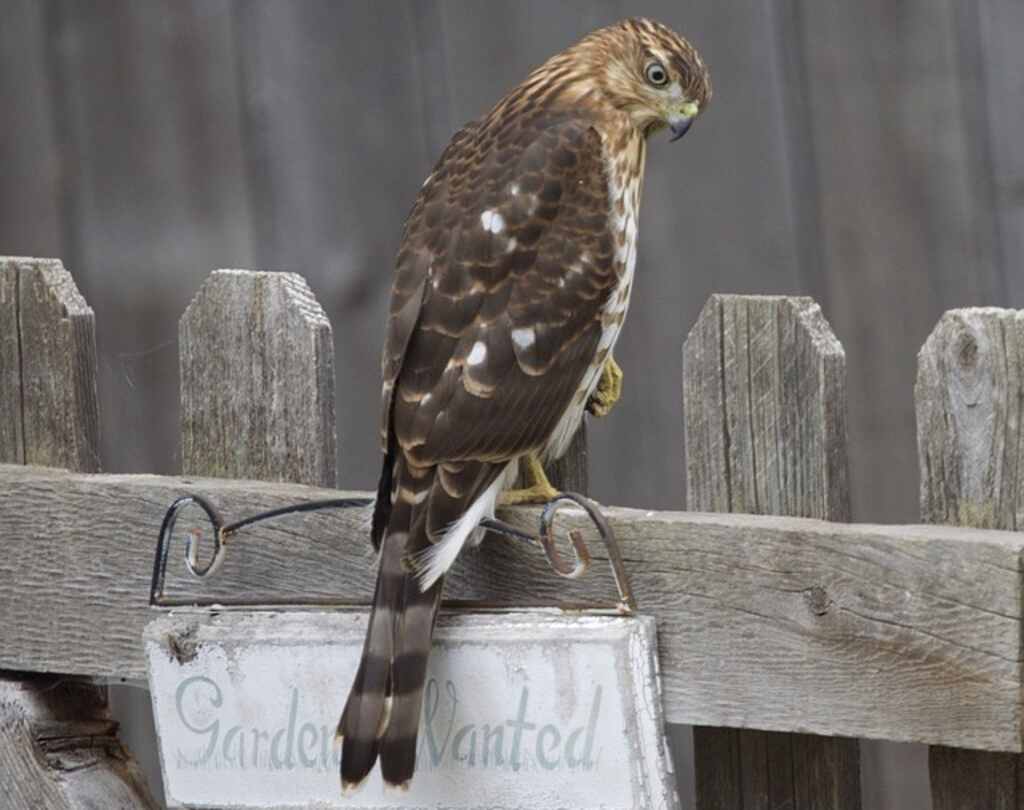
The Hunting Process
Hawks are known for their incredible hunting skills, and when it comes to hunting squirrels, they have a unique set of strategies and techniques. When a hawk spots a squirrel, it quickly approaches with great speed and agility.
The hawk uses its sharp talons to grab the squirrel while in mid-air or on a tree branch. Once the hawk secures its grip, it uses its powerful beak to kill the prey.
The process of hunting squirrels is not an easy task for hawks. They need to be swift and stealthy to catch their prey while avoiding detection by other animals in the area.
Hawks usually hunt during daylight hours when squirrels are most active. They rely on their excellent eyesight to locate their prey from high up in the sky.
Strategies Used by Hawks to Catch Squirrels
There are several strategies that hawks use when hunting squirrels. Some hawks prefer to ambush their prey from above, diving at breakneck speeds to snatch up unsuspecting squirrels below.
Other hawks will hover above the trees where squirrels are known to gather and wait for an opportunity to strike. Another technique used by some hawks is called “still-hunting.”
This involves waiting patiently on a tree branch or other high vantage point until a squirrel comes within range before attacking suddenly and unexpectedly.
Despite these various hunting methods, catching squirrels can still be a challenging task for even the most skilled predators like hawks.
Squirrels have developed defense mechanisms over time, making it hard for predators like hawks.
How Long Does It Take for A Hawk To Catch A Squirrel?
The length of time that it takes for a hawk to catch its prey varies depending on several factors such as location, habitat, species of hawk, size of squirrel among others.
Typically, though, capturing small mammals like squirrels is a comparatively easier task for hawks as compared to hunting bigger prey.
Generally, hawks are fast and agile birds that can execute their attack with great precision and speed. Once a hawk spots its prey, it swoops down quickly and grabs the squirrel with its sharp talons.
The process of capturing a squirrel can take just a few seconds or up to several minutes depending on the situation.
Factors such as the speed of the squirrel, availability of cover, and other variables may affect the length of time it takes for a hawk to catch its prey.
In general, hawks are highly efficient hunters and are known for their ability to capture prey quickly.
While hunting squirrels may present some challenges due to their quickness and agility, hawks have evolved various strategies to cope with these challenges.
The outcome of an encounter between a hawk and squirrel depends on many factors, but one thing is certain: both animals play important roles in maintaining healthy ecosystems, regardless of who prevails in each encounter.
Squirrel defense mechanisms against hawks
Squirrels are small and vulnerable animals that are constantly at risk of being hunted by predators, including hawks. Therefore, they have developed several mechanisms to protect themselves from these aerial hunters.
How do squirrels defend themselves against hawks?
One of the primary ways squirrels protect themselves from hawks is through their agility and speed. Squirrels are highly skilled climbers and jumpers, which allows them to escape quickly when they sense danger.
They can leap from tree branch to tree branch or climb up the trunk of a tree to reach safety. Additionally, squirrels can run quite fast on the ground, reaching speeds up to 12 miles per hour.
Another tactic used by squirrels is freezing in place when they sense a hawk approaching.
By remaining completely still and not moving at all, they blend in with the surrounding environment and become harder for predators like hawks to spot.
Their agility and speed as an advantage
Squirrels’ agility and speed allow them to move quickly around their environment while avoiding danger.
For example, if a hawk begins circling overhead looking for prey, squirrels can use their acrobatic skills to jump from one limb to another or quickly scamper up the trunk of a nearby tree.
In addition to this physical ability, squirrels also use their sharp senses as an advantage.
They have excellent hearing that allows them to detect approaching predators early on before they get too close. They also have keen eyesight that lets them spot potential threats in advance.
Other ways they protect themselves from predators
Squirrels also make use of other defensive tactics, such as camouflage or hiding spots. For instance, some species will change the color of their fur depending on the season so that they blend into their surroundings better.
Others will create elaborate nests high up in trees that are difficult for predators like hawks to reach.
Squirrels also have a unique behavior known as “mobbing” where they gather in groups and make loud noises in an effort to scare off predators.
This is especially effective against hawks that are more likely to retreat when faced with multiple opponents.
Squirrels have developed several defense mechanisms over time that allow them to protect themselves from predator hawks.
Their agility and speed, sharp senses, and other behaviors all work together to help these animals avoid becoming a meal for their airborne foes.
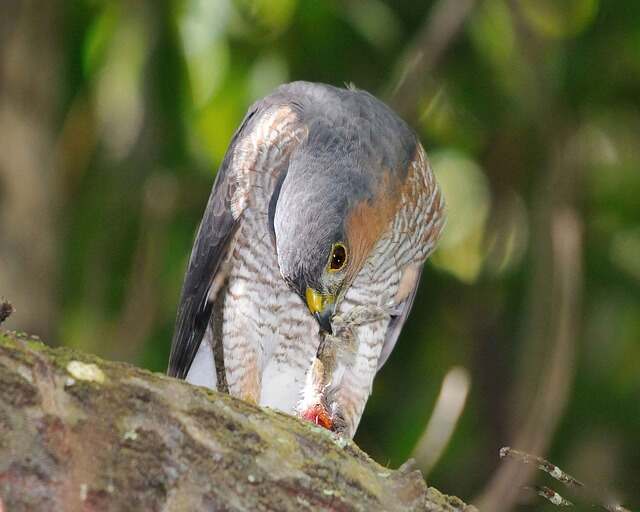
Conclusion
Summary of Main Points about Hawks and Squirrels
Hawks are birds of prey that hunt a variety of small animals, including squirrels. While not all hawks will hunt squirrels, some species do commonly target these rodents for food.
Squirrels, on the other hand, have several defense mechanisms against hawks, including their agility and speed as well as their ability to take cover in trees or burrows.
The hunting process between hawks and squirrels is a fascinating one that involves strategy and skill on both sides.
Hawks utilize various techniques to catch squirrels, while squirrels use their intelligence and physical abilities to evade capture.
Understanding this relationship between these two animals can provide insight into ecosystems and predator-prey dynamics in nature.
Importance of Understanding the Relationship between these Animals
Studying the relationship between hawks and squirrels is important for several reasons. For one, it can help us better understand how ecosystems function and how different species interact with each other.
Additionally, it can provide insight into how we can protect these animals from threats such as habitat loss or climate change.
Furthermore, understanding the relationship between these two animals can also have practical applications in areas such as pest control or wildlife management.
By understanding what types of prey hawks are likely to hunt (such as squirrels), we may be able to develop more effective methods for controlling populations of pests or other unwanted animals.
Final Thoughts on the Topic
The question whether hawks eat squirrels is one that has fascinated both scientists and nature enthusiasts for years.
By exploring this topic in-depth, we have learned about the various strategies and techniques used by both predators and prey in their quest for survival.
While it may seem like a small detail in the grand scheme of things, understanding this relationship between hawks and squirrels can provide valuable insights into the complex web of life that exists all around us.
So the next time you see a hawk or a squirrel in your backyard, take a moment to appreciate the intricate dance of predator and prey that is playing out before your very eyes.
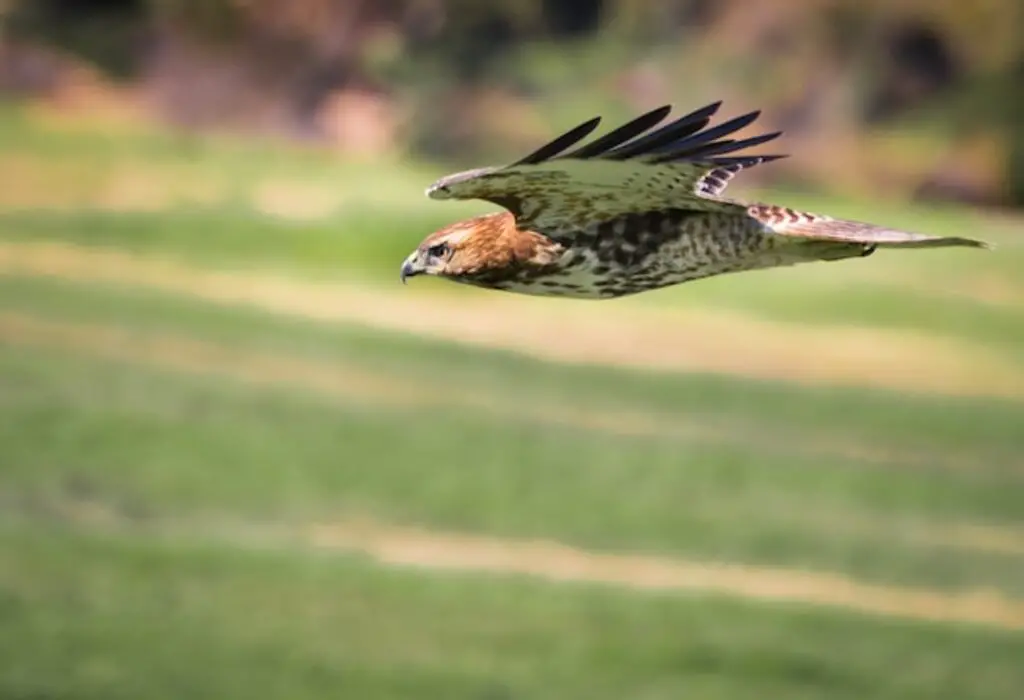
FAQs: Do Hawks Eat Squirrels?
Do hawks eat squirrels?
Yes, hawks do eat squirrels. Hawks are skilled hunters that prey on various small animals, including squirrels. However, not all hawk species hunt squirrels, and factors like size, agility, and geographic location influence their prey preferences.
What other animals do hawks eat besides squirrels?
Hawks have diverse diets and consume small mammals like mice and rabbits, birds, reptiles, and insects. The specific types of prey they hunt depend on the hawk species and their geographic location.
Why do hawks hunt squirrels?
Hawks hunt squirrels as part of their natural diet because these rodents provide an abundant food source in environments where both species coexist. However, the decision to pursue squirrels as prey depends on factors like habitat, availability of other prey, and the size and agility of the squirrel.
Which hawk species commonly hunt squirrels?
Several hawk species commonly hunt squirrels, including Cooper’s Hawks, Red-tailed Hawks, and Sharp-shinned Hawks. Each species utilizes different hunting strategies and targets squirrels based on their size and availability in the environment.
How do hawks catch squirrels?
Hawks employ various hunting techniques to catch squirrels, such as soaring from above and diving at high speeds, ambushing from trees, or still-hunting. They use their sharp talons to grab squirrels in mid-air or from tree branches, relying on their speed and agility for successful capture.
Do all hawk species hunt adult squirrels?
Larger hawk species like Red-tailed Hawks may be less likely to target larger adult squirrels due to their size and agility. Smaller hawk species such as Sharp-shinned Hawks may have more success hunting smaller juvenile or adolescent squirrels.
What defense mechanisms do squirrels have against hawks?
Squirrels have developed defense mechanisms to protect themselves from hawks, including their agility, speed, climbing abilities, and freezing in place when danger approaches. They can quickly escape by leaping between trees or running on the ground, and some species use camouflage, nests, or mobbing behavior to deter predators.
How long does it take for a hawk to catch a squirrel?
The time it takes for a hawk to catch a squirrel can vary based on factors like location, habitat, species of hawk, and size of the squirrel. Typically, hawks are fast and agile hunters, and the capture process can range from a few seconds to several minutes.
What is the significance of understanding the hawk-squirrel relationship?
Studying the relationship between hawks and squirrels provides insights into ecosystem dynamics, species interactions, and wildlife management. It helps understand how different species function within their habitats and aids in developing effective strategies for conservation and pest control.
How does the relationship between hawks and squirrels impact ecosystems?
The relationship between hawks and squirrels influences predator-prey dynamics and the overall balance of ecosystems. By controlling squirrel populations, hawks contribute to maintaining healthy ecosystems and biodiversity. Understanding this relationship contributes to our knowledge of nature’s intricate web of life.

